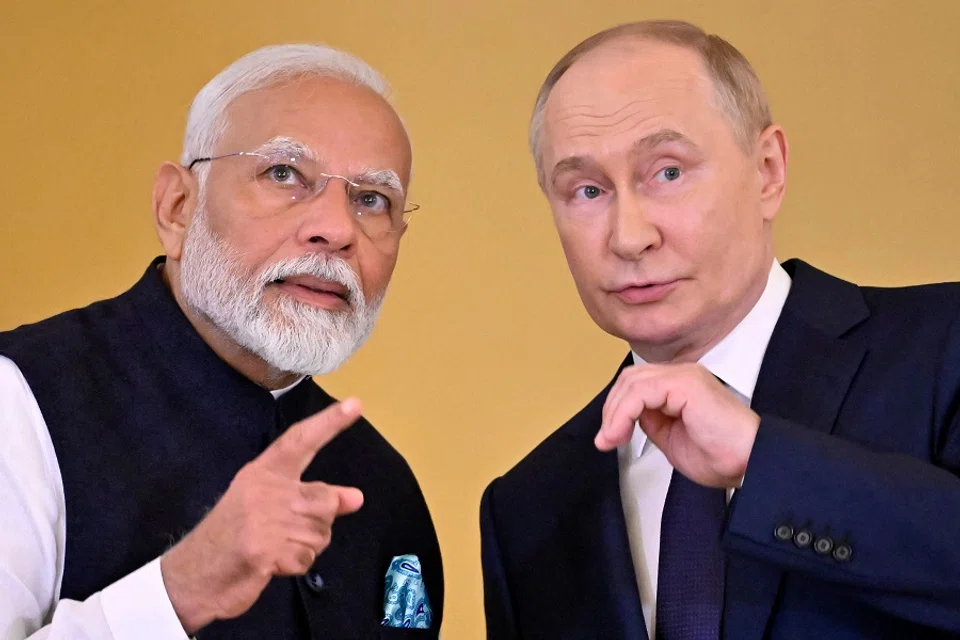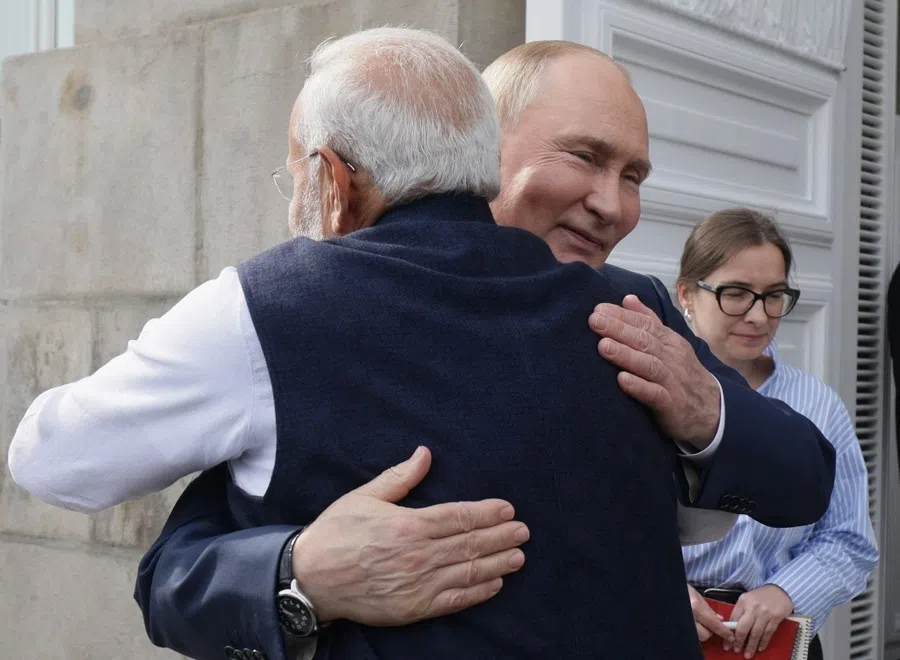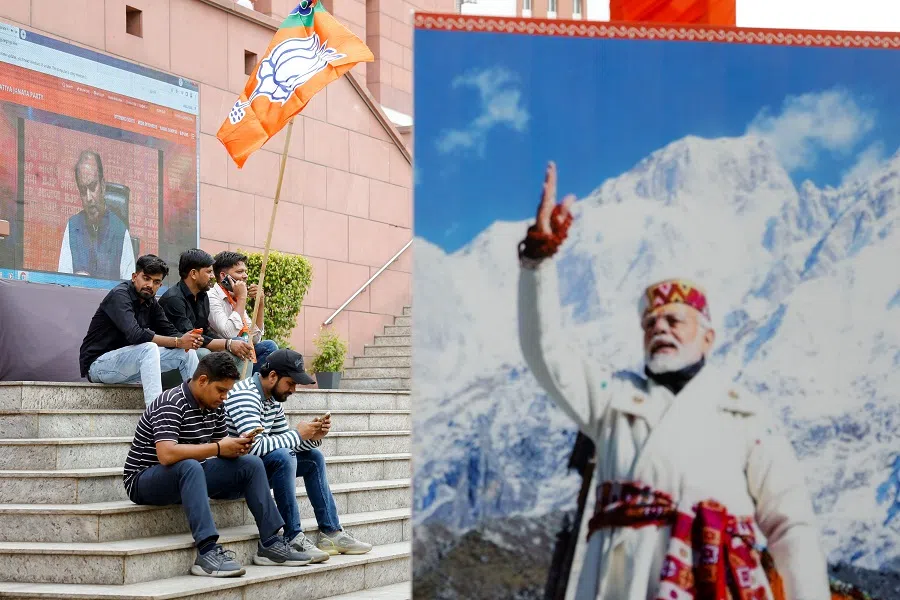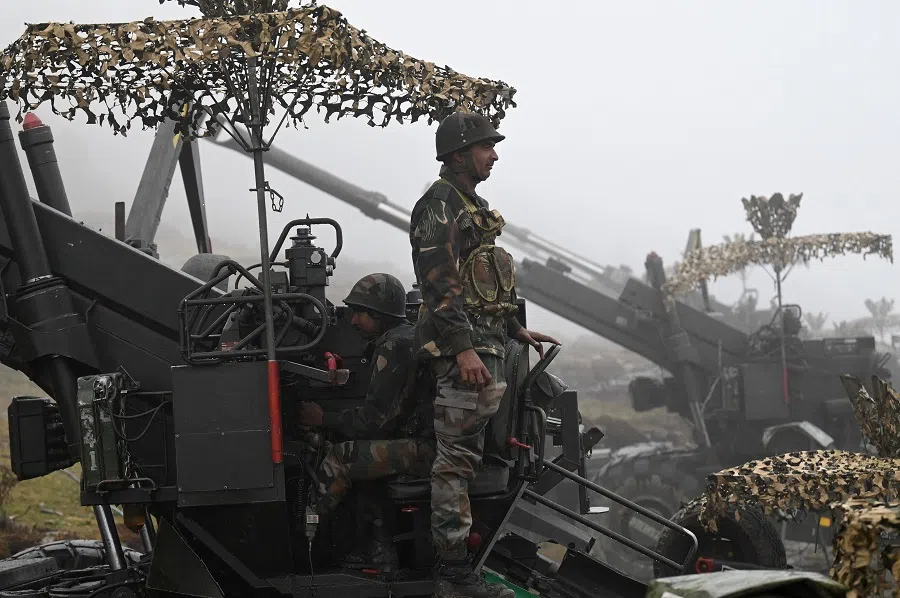Enduring bonds: India-Russia ties amid Western pressure
Indian academic Rishi Gupta observes that India’s “business as usual” approach to Russia reflects its growing diplomatic stature and commitment to strategic autonomy.

Less than two months into his third term, Indian Prime Minister Narendra Modi visited Russia on 8-9 July 2024 to participate in the 22nd India-Russia Annual Summit, which was held after a gap of three years.
Described as a “time-tested relationship”, Modi’s visit reaffirmed India’s strategic priorities amid Western condemnation and sanctions against Moscow over its war in Ukraine. Meanwhile, as India’s relations with the West, particularly the US, seem to be strengthening, the visit attracted considerable attention.
Ukrainian President Volodymyr Zelenskyy, for instance, called it a “huge disappointment and a devastating blow to the peace efforts”. Zelenskyy had met Prime Minister Modi on the sidelines of the G7 Summit in Italy on 14 June, where he thanked Modi for sending a high-level delegation to the Global Peace Summit held in Switzerland on 15-16 June.
During the meeting, Modi reiterated that “India believes in a human-centric approach and believes that the way to peace is through dialogue and diplomacy” — Delhi’s most extended articulation of its position on the Ukraine crisis. But Zelenskyy seemed dissatisfied over New Delhi’s earlier refusal to endorse the peace summit’s joint communique.
But what appears to have caused the biggest irritation for the West was the overlapping dates of Modi’s visit to Russia and the North Atlantic Treaty Organisation (NATO) Summit in Washington, DC, to mark the 75th anniversary of NATO’s founding in 1949. US senior officials had reportedly asked India to change the date of Modi’s visit, which Delhi allegedly declined.
The relationship between India and Russia has endured through geopolitical shifts and global transformations, marked by a strategic partnership spanning several decades.
A time-tested partnership
Russia has been a reliable partner for India. During the 1971 India-Pakistan War for Bangladesh’s independence from Pakistan, as President Nixon backed the Pakistani Army, which had committed atrocities against Bengali Muslims and raped millions of Bengali women, the Soviet Union supported India strategically under their Treaty of Friendship and Cooperation. The US even dispatched its Seventh Fleet to the Bay of Bengal in support of Pakistan.

Had the Soviet Union not intervened, Bangladesh’s freedom and India’s security would have been at risk. Over the years, the Soviet Union and later Russia became India’s largest defence, trade and industrial partners. Today, bilateral ties have flourished in various fields, including nuclear and space technology. The relationship between India and Russia has endured through geopolitical shifts and global transformations, marked by a strategic partnership spanning several decades.
Today, bilateral trade between India and Russia accounts for US$65.7 billion, but mostly the inflows are in the form of Russia. In the financial year 2023-24, Russian exports to India were valued at US$61.44 billion, and India’s exports were US$4.2 billion, less than 10% of the bilateral trade. While Modi seems to have discussed resolving the trade imbalance with Putin, the joint statement following the visit sets bilateral trade at US$100 billion by 2030.
... risking ties with Russia could lead to a more assertive China on India’s northern border, which would pose significant challenges to Delhi’s strategic interests.
A matter of strategic autonomy
Despite the Western sanctions and criticism, India continues to maintain business as usual with Russia. In response to the continued criticism from the West, Foreign Minister S Jaishankar said that the West needed to grow out of its mindset that its problems were the world’s problems but the world’s problems were not its problems.
Given the geopolitical dynamics, risking ties with Russia could lead to a more assertive China on India’s northern border, which would pose significant challenges to Delhi’s strategic interests. Even though India’s connection with the West, especially the US, is strong, Delhi finds their criticism of the Indian democracy discomforting.

Therefore, India has repeatedly exercised its strategic autonomy to meet its goals in complex situations such as Ukraine. Its national interests and strategic priorities guide India’s foreign policy, and it will not compromise on its energy security or geopolitical strategies to appease external pressures. For India’s defence sector, engagement with Russia is indispensable for maintaining regional stability and countering any unilateral dominance, particularly from our northern neighbour.
Counterbalancing China
India’s mounting challenges in the form of China’s military aggression at the Line of Actual Control (LAC) push Delhi to build diplomatic and defence alliances with time-tested partners such as Russia. What makes India’s current outreach with Russia more important is the “no-limits partnership” between Moscow and Beijing.
The China-Russia partnership, marked by geopolitical complexities, has evolved as Russia faces global isolation while an assertive China seeks to expand its influence and condemns the West’s “Cold War mentality”.
Against this backdrop, Delhi’s engagement with Moscow becomes critically significant. Deepening ties with Russia allows India to balance the rising Chinese assertiveness and reassures that Russia remains a strong and reliable partner, irrespective of engagement between Beijing and Moscow. India’s diplomatic efforts aim to maintain a multipolar balance in the region, leveraging its historical ties with Russia to navigate the intricate geopolitical landscape.
Delhi also needs Moscow to counterbalance and defuse China’s domination on multilateral platforms such as the BRICS and the Shanghai Cooperation Organisation (SCO).
Undeniably, China’s support for Russia has imposed a significant cost on Moscow. Moscow is adapting to Beijing’s diplomatic manoeuvres in the Eurasian region, which will likely be temporary. Once the war is over, Russia will inevitably revert to pursuing its own competitive interests in the region, as its strategic interests may not always align perfectly with China’s. Moscow might find limited long-term benefits in maintaining a subordinate role to Beijing.

Given Russia’s historical distrust towards China, Delhi would opt for a wait-and-watch strategy. Delhi also needs Moscow to counterbalance and defuse China’s domination on multilateral platforms such as the BRICS and the Shanghai Cooperation Organisation (SCO).
These platforms may help India exert greater influence and build coalitions with other member states. Russian influence in these platforms has been comforting to India, providing a strategic ally that supports India’s vision for a balanced and multipolar world order.
... honouring Modi allowed Putin to reaffirm Russia’s global influence.
Reaffirming mutual interests
Since the bloody clashes in the Galwan Valley between the Indian Army and the Chinese People’s Liberation Army (PLA) in 2020, the absence of a political dialogue between Delhi and Beijing continues to exhibit tensions at the LAC. While India expects little from its strategic partners, including the US, regarding China, it would anticipate Moscow’s mediation for peace during a full-blown war at the LAC.
The visuals of Modi receiving the highest civilian honour from his “dear friend” highlighted the strategic importance of their partnership, which is crucial for India’s defence and energy needs. Additionally, honouring Modi allowed Putin to reaffirm Russia’s global influence.
After a three-year gap, India’s resumption of the India-Russia Annual Summit marks a significant reaffirmation of their time-tested partnership, which is vital to Delhi’s energy and defence procurements. The summit has facilitated discussions on a wide range of issues, including energy collaboration, military hardware acquisition, and bilateral trade, thereby strengthening the multifaceted cooperation that has historically defined India-Russia relations. It also reflects India’s growing diplomatic stature as it conveys its commitment to strategic autonomy and balanced diplomacy to the West.





